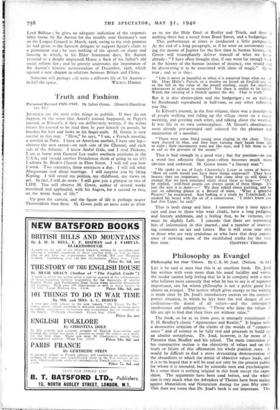Truth and Fashion
Personal ReCord 1928-1939. By Julian Green. (Hamish Hamilton. 12s. 6d.)
JouuraLs are the most risky things to publish. If they do not happen, in the sense that Amiel's journal happened, or Pepys's journal, or Kilvert's, if they are deliberately written, if the writer means his journal to be read then he puts himself on parade, he brushes his hair and looks to his finger-nails. M. Green is very careful in this way. "Here," he says, "I am, a French novelist, a novelist in Paris. I have an American mother, I have one leg— observe the neat crease—on each side of the Channel, and each side of the Atlantic. I know Andre Gide, and I read Dickens. I am at home with General Lee under southern porticoes in the U.S.A., and (would another Frenchman think of going to see it?) I admire St. Bride's Church in Fleet Street. I will tell you how I work. Two sentences, three sentences a day. I will tell what Maupassant said about marriage. I will surprise you by liking Kipling. I will reveal my politics, my childhood, my views on art. In fact, I will do more: I will give you a glimpse or two of LIFE. You will observe M. Green, author of several works translated and applauded, with his fingers, for a second or two, on the warm body of life."
Up goes the curtain, and the figure of life is perhaps nearer Thorwaldsen than flesh. M. Green pulls an arras aside to allow
us to see the Holy Grail of Reality and Truth, and there is nothing there but a vessel from Bond Street, and a budgerigar.
This performance at times is conducted a little pompou At the end of a long paragraph, as if he were an astronomer _ ing the moons of Jupiter for the first time in human history,
Green will triumphantly deliver himself of what we know already : " I have often thought that, if one went far enough bid( in the history of the human instinct of decency, one would end by discovering it to be associated with ideas of magic." Qt: to
true ; and so is this:
" Life is never so beautiful as when it is removed from what we life. Does Hitler's Putsch, or a mutiny on board an English cru, or the fall in the value of the pound sterling, count for anything whatsoever in relation to eternity? Not there is reality to be found. Watch the swaying of a branch against the sky. That is truth."
But it is also electro-plate and the budgerigar ; or an etch,;:g by Rembrandt reproduced in half-tone, or any other reflection you like.
In Kilvert's journal, in the first volume, there was a description of people walking and riding up the village street on a sunny morning, and greeting each other, and talking about the weather. It was life in its own commonplace. M. Green's observations seem already pre-arranged and selected for the pleasure and rumination of a novelist: " There were some blind young men singing in the choir. They were dressed in blue, and they kept turning their heads from left to right ; their movements were not like ours, and I felt them to be as sad as the gestures of the insane."
That is bad enough in a good way ; but the position—to use a word less offensive than pose—often becomes much more obvious and awkward. M. Green meets "a literary man" • t` He spoke to me of Lady Chatterley's Lover in tones of horror. `How on earth would you have these things expressed? They have beauty, they are important. Those who come after us will think it strange that we have remained silent about them so long—' Oh,' he replied, well-bred people can always speak of these things. It's just the way it is done—' We then talked about painting, and he cast an admiring glance at a Berard of mine. ' What a splendid Picasso!' he murmured. And looking at a study by Tchelitcheff, he stroked his beard with the air of a connoisseur. ` I didn't know you had that Lippi,' he said."
That is both cheap and false. I conceive that it may appear rare and true to those who wear cloaks, have a long pedigree, and literary ambitions, and a feeling that, to be virtuous, one must be slightly Left. I concede that there are interesting bits of information in this journal ; and a number of interest- ing comments on art and letters. But it will seem true only to those who are very credulous or who have that deep experi- ence of meeting some of the established truths for the very






























 Previous page
Previous page